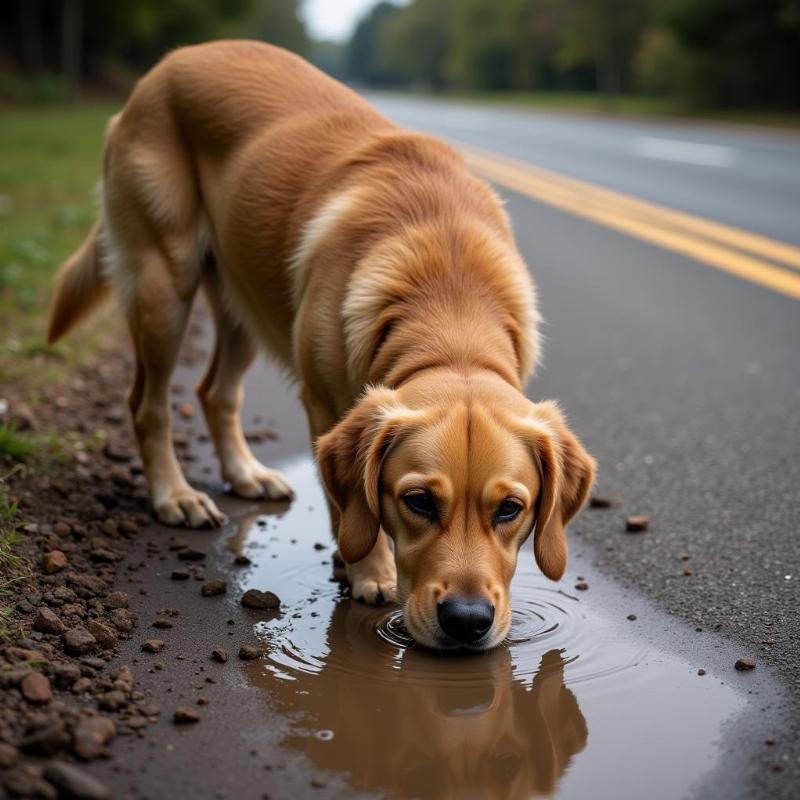Losing a dog is a terrifying experience. The immediate question that plagues every owner is, “How long can my dog survive out there?” The answer, unfortunately, isn’t simple. Survival time depends on a complex interplay of factors, from the dog’s breed and age to the environment and their resourcefulness. Let’s explore these factors to understand how to maximize the chances of a safe return.
Factors Influencing a Lost Dog’s Survival
A dog’s ability to survive outdoors depends on various factors. A young, small dog accustomed to a pampered indoor life will likely fare worse than a larger, more resourceful breed used to spending time outdoors. Access to food and water is paramount. In urban environments, dangers like traffic pose a significant threat, while in rural areas, predators and harsh weather become primary concerns. A dog’s temperament also plays a role. A fearful dog might hide, making them harder to find, while a friendly dog might approach strangers, increasing their chances of being helped.
Environmental Challenges
Weather extremes are a major concern. Extreme heat can lead to dehydration, while freezing temperatures can cause hypothermia. Access to shelter becomes crucial in such conditions. Predators, both wild and domestic, pose a serious threat, especially to smaller dogs. In urban areas, traffic accidents are a leading cause of injury and death for lost dogs.
 Lost Dog Drinking from Puddle
Lost Dog Drinking from Puddle
The Dog’s Individual Characteristics
Breed, age, and health status all contribute to survival. A healthy, adult dog in good physical condition will generally be more resilient. A dog’s training also plays a role. A well-trained dog might be more likely to respond to calls or approach people for help. Microchipping and collar tags significantly increase the chances of reunification.
Availability of Resources
Access to food and water is essential. A lost dog might scavenge for food in garbage cans or hunt small animals. Water sources like puddles, streams, and even dew can provide hydration. However, these sources can also be contaminated, leading to illness.
How to Increase Your Dog’s Chances of Survival if Lost
While the thought of a lost dog is unsettling, there are proactive measures you can take. Ensure your dog is microchipped and wears a collar with updated identification tags. Regular obedience training can make a significant difference in a lost dog’s behavior. Teaching your dog to come when called, even when distracted, is invaluable. Familiarizing your dog with different environments can also help them adapt if they become lost.
What to Do if Your Dog Gets Lost
If your dog goes missing, act immediately. Search your immediate area thoroughly. Contact local animal shelters, veterinary clinics, and animal control. Utilize social media and lost pet websites to spread the word. Consider creating and distributing flyers with your dog’s picture and information.
Frequently Asked Questions
- How long can a lost dog survive without food? A healthy dog can survive for several days, even weeks, without food, but water is much more critical.
- Do lost dogs find their way home? While some dogs possess remarkable navigational skills, it’s not guaranteed. Microchipping and identification are crucial.
- What are the biggest dangers for a lost dog? Traffic, predators, extreme weather, and lack of access to clean food and water are major threats.
- How can I prevent my dog from getting lost? Secure fencing, proper identification, and obedience training are key preventative measures.
- What should I include on my dog’s ID tag? Your dog’s name, your phone number, and your address are essential.
- Are there any apps that can help me find my lost dog? Yes, several apps utilize GPS tracking and community reporting to help locate lost pets.
- Should I offer a reward for my lost dog? While a reward can motivate people to help search, it can also attract unscrupulous individuals. Consider the pros and cons carefully.
Conclusion
The question of how long a lost dog can survive is complex. By understanding the factors that influence survival and taking proactive steps, you can increase the chances of a happy reunion. Being prepared and acting swiftly when a dog goes missing is crucial for a successful outcome. Remember, microchipping, identification tags, and obedience training are essential tools in safeguarding your furry companion.
Beautdogs.us is your premier resource for all things dog-related in the US. We offer expert advice on dog breeds, care, and products, catering to both new and experienced dog owners. From understanding breed-specific needs to navigating the latest trends in pet care, Beautdogs.us is your trusted companion on the journey of dog ownership. Contact us today for all your dog-related inquiries at [email protected] or call us at +1 501-555-7529.